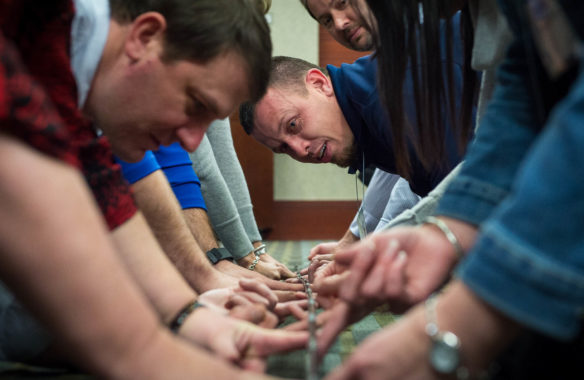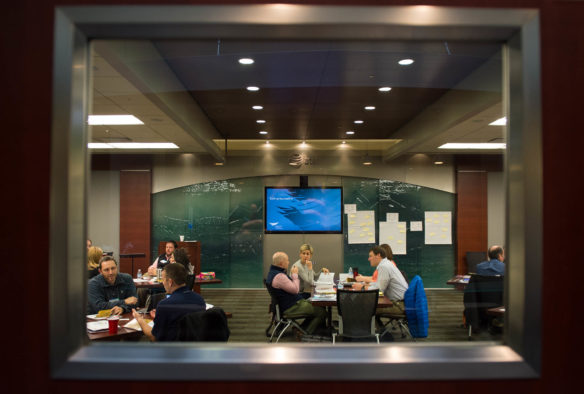
Jonathan Miller, the principal at Graves County Middle School, helps direct his team to put a rod on the ground as part of a group exercise during the Leadership Institute for School Principals. The institute is an initiative of the Kentucky Chamber of Commerce that provides executive-style leadership training to school principals.
Photo by Bobby Ellis, Jan. 26, 2017
By Mike Marsee
michael.marsee@education.ky.gov
In this room, principals come first.
That isn’t always the case at their schools, where principals are often working for the betterment of their teachers and students. It is, however, the singular focus of the Leadership Institute for School Principals, which seeks to improve Kentucky’s schools by creating stronger leaders.
The institute is an initiative of the Kentucky Chamber of Commerce that provides leadership training to school principals that is vastly different from most of the training they have received.
“It has been very enlightening,” said Doug Cotton, the principal at South Todd Elementary School (Todd County). “Most of the professional development that I’ve encountered in the past is about how to help teachers or how to help students. This has been specific to me as a leader: ‘How do I become a better leader?’ not ‘How do I help others?’ I’ve been very thankful for it, and I have learned volumes about why I do some of the things I do.”
In the institute, principals receive the same type of training that is offered to leaders in the business world.
“This is an executive leadership program,” said Andy Cole, one of the trainers from the Center for Creative Leadership, a nonprofit that has conducted the institute for the Kentucky Chamber for the past six years.
The training has been available to principals in Kentucky since 2011, when the leadership institute was founded after the chamber identified improving education in Kentucky as its top legislative priority.
“The board really wanted us to look into something that would have an impact across the Commonwealth,” said Kelly Wolf, the Kentucky Chamber’s senior vice president for membership and marketing. “In our research, we have found that a strong principal is the most vital thing for student success at a school.”
More than 300 principals have graduated from the program. Another 48 are completing the program this winter, and the application deadline is approaching for next year’s class.
“We’ve gone from not being sure how we were going to make a bigger impact in their schools to hearing things like, ‘This is life-changing,’” Wolf said. “One principal at an elementary school talked about how their scores have raised, and principals from high schools have told us their ACT scores are improving at a faster rate.”
Amanda Ellis, an associate commissioner at the Kentucky Department of Education, was the principal at Emma B. Ward Elementary School (Anderson County) when she took part in the leadership institute in the 2012-13 school year. She said the program helped her identify her strengths and weaknesses as a leader.
She said participants set personal and professional goals aligned to their daily work, and coaches checked in a couple of times during the year on the progress toward meeting those goals.
“One of the professional goals for me was to better empower my staff and not just take all the work on my shoulders,” Ellis said. “Through that deep reflection, I realized there were a lot of missed opportunities for some of my teacher leaders or those who were aspiring to be leaders. I put a little effort into that, and that really improved both the leadership and the trust. They realized that I didn’t just say I trusted them, but that I demonstrated that.
“When I left a year and a half later, I could still see the fruits of my labor. I told the staff when I left, ‘It shouldn’t matter who’s in the office, you know what to do and you know how to run this building.’ They have continuously improved.”

Principals share notes with each other after a reading at the Leadership Institute for School Principals at the Kentucky Chamber of Commerce offices. Forty-eight principals are selected annually for the program, which is in its sixth year.
Photo by Bobby Ellis, Jan. 26, 2017
Principals who are going through the institute this year said it is much different from what they expected when they signed on.
“I thought that it was going to be more about being a principal – the curriculum, instruction and assessment – and it was the furthest thing from that,” said Leigh Ann McLaughlin, principal at Southern Elementary School (Fayette County). “It’s all about yourself as a leader, a decision-maker, an influencer, which was refreshing.”
Angie Akers, principal at Glasscock Elementary School (Marion County), said she also expected a typical professional learning program.
“It has been fantastic for my professional growth, but one thing that sets it apart is that is has been a personal journey for me,” Akers said. “There are many self-assessments. You look at yourself and your personality, and then you figure out how you can use your personal traits to have a positive impact on others.”
Ellis said it is often uncomfortable for principals to focus on themselves, but she said the inward focus of this program is what makes it valuable for principals.
“We tend to plan the professional learning specific to the needs of the teachers, and we always overlook our own needs. And what happens is we become very stagnant and outdated and we don’t take time to reflect, and when we don’t reflect we just keep doing what we’ve always done, and there’s no real improvement or intentional work on that,” she said.
The principals’ training begins with a series of assessments in which they evaluate themselves and are evaluated by superiors, peers and those who report to them. They spend three days in the summer at the Center for Creative Leadership’s headquarters in Greensboro, then attend a pair of two-day meetings in Frankfort.
“Those days in the summer seem like a lot, but it was some of the best spent time I’d ever had as an administrator,” Ellis said.
And it doesn’t cost the principals a dime to participate in the program. Fees and travel costs – estimated by the chamber at $9,000 per principal – are covered by the Kentucky Chamber Foundation.
“After the pilot program was a great success, we decided to do it for five years. We raised over $3 million to invest in about 350 school principals,” Wolf said. “This year we decided to continue our program. It’s not something we see going away any time soon as long as we have the funding from the business leaders.”
Wolf said the chamber gets 120 to 130 applications each year. Forty-eight principals are accepted and divided into two cohorts that focus on three areas: themselves, change and power and influence.
“They look for principals that are earlier in their careers, because research has shown that those principals can have a greater impact,” she said.
Jonathan Miller, principal at Graves County Middle School, said he began applying what he was learning at the institute well before he completed his training.
“I’ve taken several of these learning activities that we do that are hands-on, and I’ve carried those over into my faculty meetings. We talk about the same meanings and the same learning experiences that we talk about here,” Miller said.
Cotton said he has applied some of the principles he has learned to a teacher mentoring program at his school.
“I have seen the results of that, that sometimes what I think I’m communicating is not actually being heard the way I think it’s being spoken. So I’m becoming more intentional about how I communicate my ideas and my vision of the school to my teachers,” he said.
McLaughlin also said she is now more aware of how she leads at Southern Elementary.
“It has caused me to reframe thinking and be more purposeful in how I use my position of influence in my school community. It has caused me to reflect on current and future practices that impact children and impact my teachers and staff,” she said.
The participating principals said their schools will be better as they become better leaders.
“I believe the leader of the school impacts the whole school, so everything I learn here I can carry over to my teachers, my students, my parents, community members, shareholders,” Miller said. “It is going to have a great impact on my school. It already has.”
MORE INFO …
Angie Akers angie.akers@marion.kyschools.us
Doug Cotton doug.cotton@todd.kyschools.us
Leigh Ann McLaughlin leighann.mclaughlin@fayette.kyschools.us
Jonathan Miller jonathan.miller@graves.kyschools.us
Kelly Wolf kwolf@kychamber.com





[…] Read More […]
[…] Read More […]